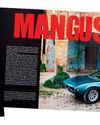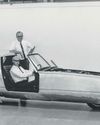
THIS YEAR MARKS the 150th anniversary of the garment that became the most popular item of apparel ever, turning the world indigo blue. On Tuesday 20 May 1873, Jacob W Davis and Levi Strauss & Co of San Francisco were granted US Patent No.139,121 for 'work pants: reinforced with metal rivets. The following month The Pacific Rural Press, a local San Francisco newspaper, carried a modest ad announcing the granting of the patent, concluding with the statement: 'Levi Strauss & Co of this city are sole agents for the new manufacture, and will soon place them in the market in large quantities, so that our miners, farmers and workingmen can supply themselves with superior overalls. Little could anyone have imagined quite how large those 'large quantities' would be.
Jewish immigrant Levi Strauss arrived in New York from Germany in 1847 to join his two brothers in their dry goods wholesale business just as the California Gold Rush kicked off. With thousands making their way west to seek their fortunes, the Strauss clan decided to join the 'rush' by dispatching Levi in 1854 to open a San Francisco branch.
At around the same time, 23-year-old tailor Jacob Youphes, born in Riga, Latvia, arrived in the US and changed his name to Jacob Davis. He settled in Reno, Nevada, making tents and horse blankets for workers on the Central Pacific Railroad, purchasing his material - nine-ounce 'serge de Nîmes' and ten-ounce white duck twill - from Levi Strauss.
Denne historien er fra September 2023-utgaven av Octane.
Start din 7-dagers gratis prøveperiode på Magzter GOLD for å få tilgang til tusenvis av utvalgte premiumhistorier og 9000+ magasiner og aviser.
Allerede abonnent ? Logg på
Denne historien er fra September 2023-utgaven av Octane.
Start din 7-dagers gratis prøveperiode på Magzter GOLD for å få tilgang til tusenvis av utvalgte premiumhistorier og 9000+ magasiner og aviser.
Allerede abonnent? Logg på

The Pro route to faster lap times
Mercedes-AMG GT 63 Pro 4Matic+

The power to corrupt
2024 Aston Martin Vanquish

Hyperactivate!
1967 Austin-Cooper MkII 998 by Crafted Classics Tuning Glen Waddington

De Tomaso Racing Blue Blood
IF THE MARQUE De Tomaso is mainly familiar to you through cars such as the Mangusta, the Pantera, maybe the Longchamps and, if you're next-level classic car geek, racers such as the P70, then the sheer variety to be found in this mammoth tome is going to come as something of a shock. There are literally dozens profiled here, and one or two will probably be news to even the most seasoned enthusiast.

The best watch in the world
We've been here, but it bears repeating these gems will soon be cheaper than a 1st class stamp

A star is reborn
This recently revived coachbuilt beauty made the final four at the Pebble Beach concours in August

REINVENTING THE WHEEL
The gyroscopically stabilised Gyro-X blurred the line between reality and science fiction. Sam Glover takes the prototype for a spin

SAYONARA GT-R
After a remarkable 17-year career, the supercar-humbling Nissan GT-R bows out on a high

Shiro Nakamura
Nissan’s long-standing Chief Creative Officer became architect of the marque’s style-led revival… and is also known as ‘Mr GT-R’

LIGHT SPARKS
How does the electric Tesla Roadster compare today?